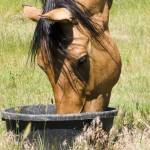Hindgut Health in Horses: Rely on Oral Buffers to Limit Dysbiosis

Buffering the hindgut through the use of oral gastrointestinal health supplements in the face of a starch overload could help limit acidosis, dysbiosis and, ultimately, laminitis. One study recently found that directly buffering the cecum with an injectable alkaline buffer intensified the intestinal disturbances and risk of laminitis in horses subjected to starch overload.
Starches are typically digested enzymatically in the small intestine. When excess starch is fed, it escapes enzymatic digestion and is instead fermented in the hindgut. Here’s how it happens:
- Starch fermentation produces lactic acid, which lowers the pH of the hindgut;
- Acid-sensitive bacteria that make up the normal intestinal microbiome die;
- These dead bacteria release endotoxins, which compromise the lining of the intestine; and
- The intestinal wall becomes “leaky,” allowing endotoxins, inflammatory mediators, and bacteria to be absorbed into the horse’s bloodstream, potentially resulting in laminitis.
“Limiting starch and abrupt dietary changes in managed horses is often unavoidable. Thus, finding ways to minimize these detrimental changes in the gastrointestinal tract will help offset microbial disturbances, leaky gut, and laminitis risk,” explained Ashley Fowler, Ph.D., a nutritionist for Kentucky Equine Research.
She added, “Sodium bicarbonate is an effective buffer for controlling the pH of the gastrointestinal tract when administered orally, but considerations must be followed. Time-release technology, like that used to create Kentucky Equine Research’s EquiShure, ensures targeted release of the sodium bicarbonate in the hindgut, where it provides the most benefit for controlling hindgut acidosis.”
In the aforementioned study, the effects of an alkaline buffer solution containing magnesium hydroxide and aluminum hydroxide administered directly into the cecum were explored.* Researchers hypothesized that this solution would help minimize the detrimental changes in the hindgut induced by a starch overload.
Healthy adult horses underwent surgery to permanently fix the cecum to the wall of the abdomen to allow direct access through a tube on the outside of the horse’s body. Starch overload was induced by administering cornstarch and water via nasogastric tube. Eight hours later, either saline or the alkaline buffer solution was administered through the tube. Horses were monitored at set time points for the subsequent 72 hours, and fecal microbiota and fecal analyses were conducted.
“The starch overload produced the expected changes in the microbiome, reducing the richness and diversity, as well as the number, of bacteria present. What wasn’t expected was that horses administered the alkaline solution directly into the cecum had a significantly greater increase in the amylolytic (starch-digesting) bacteria than in horses administered only saline. Further, the fibrolytic bacteria were also significantly decreased in the treatment group compared to the saline control,” explained Fowler.
In addition, administering the alkaline solution cecally after starch overload caused diarrhea and lameness.
Together, these data suggest that directly buffering the cecal environment worsened the negative effects induced by starch overload.
The researchers explained why this might have happened. Putting the alkaline solution directly into the cecum bypasses the absorption of magnesium that occurs in the small intestine, resulting in a large amount of magnesium entering the hindgut at once. Further, the two ingredients in the alkaline solution—magnesium hydroxide and aluminum hydroxide—can be irritating to the lining of the cecum, leading to inflammation and dysbiosis.
“EquiShure, which contains sodium bicarbonate, is an effective orally administered hindgut buffer that functions by counteracting lactic acid production and preventing a drop in fecal pH when horses are fed high-starch feeds,” shared Fowler.
*Bustamante, C.C., V.B. de Paula, I.P. Rabelo, C.C. Fernandes, L.T. Kishi, P.A. Canola, E.G.d.M. Lemas, and C.A.A.A. Valadao. 2022. Effects of starch overload and cecal buffering on fecal microbiota of horses. Animals (Basel) 12(23):3435.








